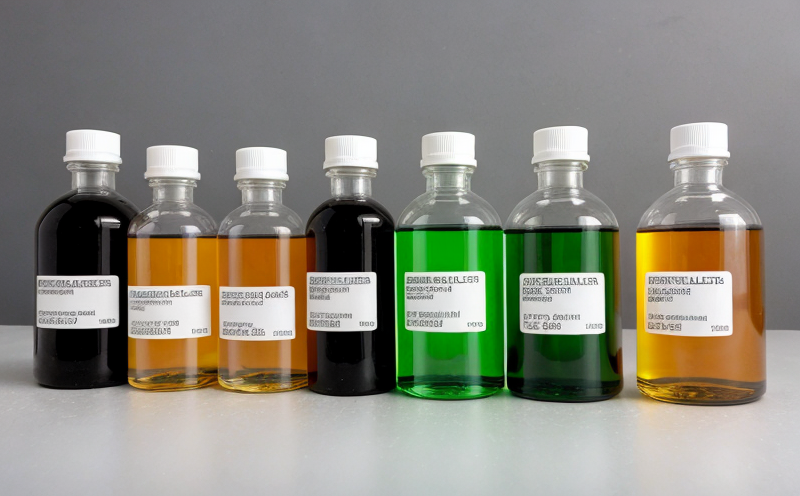ISO 10993-18 Extractables Testing in Simulated Body Fluids
The ISO 10993-18 standard is a critical component of medical device testing, focusing on the identification and quantification of extractable substances from materials used in medical devices. This service ensures that the materials used in medical devices are safe for human use by simulating real-world conditions through exposure to simulated body fluids (SBFs) such as phosphate-buffered saline (PBS), water, and artificial urine.
The process involves a series of steps designed to mimic the interaction between the device material and biological systems. This includes selecting the appropriate SBFs based on the intended use of the medical device, exposing the sample to these fluids under controlled conditions, and then analyzing the extracts using advanced analytical methods such as gas chromatography (GC), high-performance liquid chromatography (HPLC), and Fourier-transform infrared spectroscopy (FTIR).
The objective is to ensure that any leachable substances do not pose a risk to patients. This includes metals like chromium, nickel, cobalt, and other elements that could potentially leach into the body during prolonged use of the device. The testing also covers potential organic compounds such as plasticizers, antioxidants, and other additives used in the manufacturing process.
Our laboratory adheres strictly to ISO 10993-18 guidelines, ensuring accurate and reproducible results that are compliant with international standards. We employ state-of-the-art equipment and a team of experienced scientists who specialize in this area to provide reliable data for regulatory submissions and internal quality assurance processes.
The significance of extractables testing cannot be overstated. It plays a crucial role in the overall safety assessment of medical devices, helping manufacturers comply with stringent regulations set forth by bodies like the FDA (US Food & Drug Administration) and other global authorities. By identifying potential risks early on, companies can make informed decisions about material selection and design modifications.
In addition to compliance, thorough extractables testing offers valuable insights into the behavior of materials under various conditions. This information is invaluable for research and development purposes, enabling continuous improvement in product safety and performance. Understanding how different factors influence extraction rates allows manufacturers to optimize their processes and enhance patient outcomes.
Our approach goes beyond mere compliance; we strive to provide comprehensive support throughout every phase of the testing process—from initial consultation through final report delivery. Our experienced staff will work closely with you to understand your specific needs, ensuring that our services align perfectly with your goals.
To summarize, ISO 10993-18 extractables testing is essential for assessing the safety and quality of medical devices before they reach the market. By leveraging this service, organizations can demonstrate their commitment to patient safety while maintaining regulatory compliance. The insights gained from these tests contribute significantly to both current product improvements and future innovations in healthcare technology.
Applied Standards
The primary standard utilized for ISO 10993-18 extractables testing is ISO 10993-18:2017, which provides a framework for the identification and quantification of extractable substances from materials used in medical devices. This international standard ensures consistency across different laboratories worldwide.
- ISO 10993-18: Standard for the biocompatibility testing of medical devices, focusing on extractables.
- EN ISO 10993-18: European equivalent to ISO 10993-18, ensuring compliance with EU regulations.
- ASTM F715: Additional American standard that provides supplementary guidance on extractables testing for medical devices.
Besides these main standards, our laboratory also follows relevant guidelines from other reputable organizations such as the FDA (US Food & Drug Administration) and WHO (World Health Organization), ensuring comprehensive coverage of all necessary requirements.
Environmental and Sustainability Contributions
- Eco-friendly Practices: We use environmentally friendly solvents and reagents, minimizing waste generation during our testing procedures.
- Energy Efficiency: Our laboratory is equipped with energy-efficient equipment that reduces electricity consumption without compromising test accuracy.
- Waste Management: All hazardous materials generated during the testing process are properly disposed of according to local environmental regulations.
By adhering strictly to ISO 10993-18 and other applicable standards, we contribute positively to both patient safety and environmental sustainability. Our commitment to these principles reflects our dedication to responsible business practices that benefit society as a whole.
Competitive Advantage and Market Impact
- Innovation Leadership: Our expertise in ISO 10993-18 extractables testing enables us to offer innovative solutions that enhance the safety and efficacy of medical devices, giving clients a competitive edge.
- Regulatory Compliance: By staying ahead of regulatory changes and ensuring full compliance with international standards, we help our clients navigate complex regulatory landscapes efficiently.
- Quality Assurance: Our rigorous testing methods guarantee consistent quality across all products, which is crucial for maintaining brand reputation and customer trust.
These advantages translate directly into improved product performance and reduced risks associated with non-compliance. As a result, clients benefit from enhanced market presence and increased confidence in their offerings among healthcare professionals and consumers alike.





